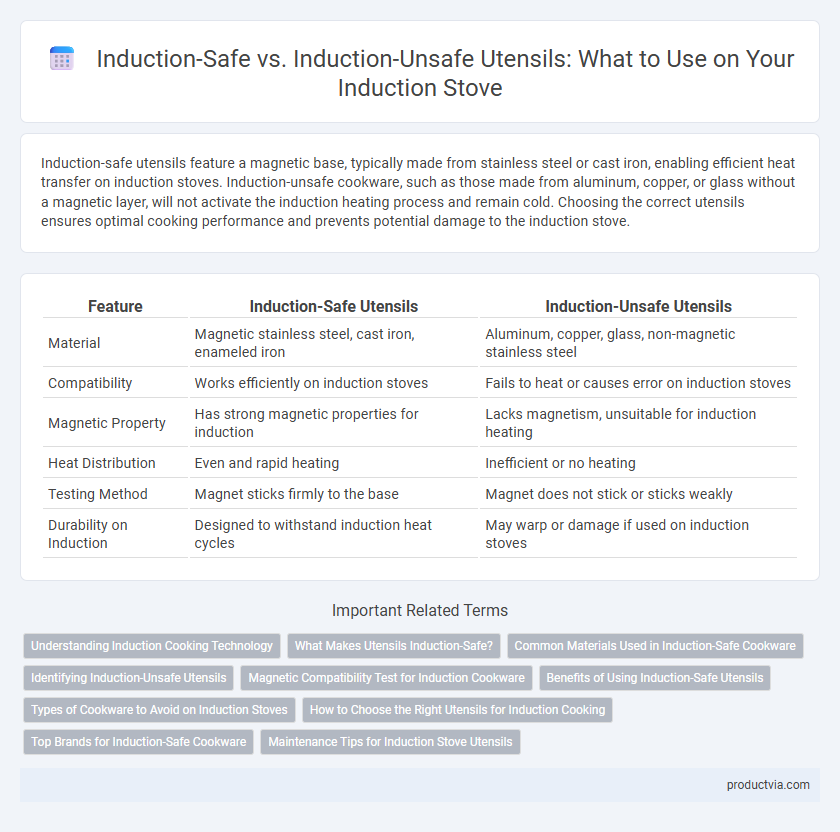Induction-safe utensils feature a magnetic base, typically made from stainless steel or cast iron, enabling efficient heat transfer on induction stoves. Induction-unsafe cookware, such as those made from aluminum, copper, or glass without a magnetic layer, will not activate the induction heating process and remain cold. Choosing the correct utensils ensures optimal cooking performance and prevents potential damage to the induction stove.
Table of Comparison
| Feature | Induction-Safe Utensils | Induction-Unsafe Utensils |
|---|---|---|
| Material | Magnetic stainless steel, cast iron, enameled iron | Aluminum, copper, glass, non-magnetic stainless steel |
| Compatibility | Works efficiently on induction stoves | Fails to heat or causes error on induction stoves |
| Magnetic Property | Has strong magnetic properties for induction | Lacks magnetism, unsuitable for induction heating |
| Heat Distribution | Even and rapid heating | Inefficient or no heating |
| Testing Method | Magnet sticks firmly to the base | Magnet does not stick or sticks weakly |
| Durability on Induction | Designed to withstand induction heat cycles | May warp or damage if used on induction stoves |
Understanding Induction Cooking Technology
Induction cooking technology relies on magnetic fields to generate heat directly within induction-safe cookware, requiring materials like cast iron or stainless steel with ferromagnetic properties for efficient energy transfer. Utensils made from non-magnetic materials such as aluminum, copper, or glass are induction-unsafe and will not heat properly on induction stoves. Recognizing the compatibility of cookware ensures optimal performance and energy efficiency in induction cooking.
What Makes Utensils Induction-Safe?
Utensils are induction-safe when they contain ferromagnetic materials such as cast iron or magnetic stainless steel, which allow the induction stove's magnetic field to generate heat directly in the cookware. Non-magnetic materials like aluminum, copper, or glass lack the magnetic properties needed for induction heating, making them induction-unsafe unless they have a magnetic base. The key factor determining induction compatibility is the utensil's ability to complete the electromagnetic circuit required for efficient heat transfer on an induction cooktop.
Common Materials Used in Induction-Safe Cookware
Induction-safe utensils are typically made from ferromagnetic materials such as cast iron, magnetic stainless steel, and certain types of enamel-coated steel, which allow the magnetic field of the induction stove to generate heat efficiently. Common induction-unsafe materials include aluminum, copper, glass, and non-magnetic stainless steel, as they lack the necessary magnetic properties to interact with the induction cooktop. Choosing cookware with a magnetic base ensures optimal energy transfer, faster heating times, and improved cooking performance on induction stoves.
Identifying Induction-Unsafe Utensils
Induction-unsafe utensils lack a magnetic base or are made from non-ferrous materials like aluminum, copper, glass, or ceramic, which prevents efficient heat transfer on induction stoves. These utensils often result in no heating or uneven cooking because the induction stove relies on electromagnetic fields to generate heat directly in the cookware. To identify induction-unsafe utensils, use a magnet test--if a magnet does not stick firmly to the utensil's base, it is incompatible with induction cooking.
Magnetic Compatibility Test for Induction Cookware
Induction stoves require cookware with magnetic properties to generate heat efficiently, making the Magnetic Compatibility Test essential for determining induction-safe utensils. This test involves placing a magnet on the base of the cookware; if the magnet sticks firmly, the utensil is induction-safe and will work effectively on the induction stove. Cookware made from ferrous metals like cast iron or stainless steel with a magnetic base passes this test, whereas aluminum, copper, or glass cookware without magnetic capabilities is induction-unsafe.
Benefits of Using Induction-Safe Utensils
Induction-safe utensils feature ferromagnetic properties that enable efficient heat transfer directly to the cooking surface, reducing energy waste and cooking time. Using compatible cookware prevents damage to the induction stove's cooktop and ensures even cooking results by maintaining consistent temperature control. These utensils enhance safety by minimizing the risk of burns and accidental overheating, making them essential for optimal induction stove performance.
Types of Cookware to Avoid on Induction Stoves
Avoid cookware made from non-magnetic materials such as aluminum, copper, glass, and ceramic when using induction stoves, as they cannot generate the necessary electromagnetic field for heating. Cookware with warped or uneven bottoms also fails to maintain proper contact with the induction cooktop surface, reducing efficiency and causing uneven cooking. Induction-unsafe utensils lack ferromagnetic properties, which are essential for compatibility with induction technology.
How to Choose the Right Utensils for Induction Cooking
Choosing the right utensils for induction cooking requires understanding magnetic compatibility, as only induction-safe cookware with ferromagnetic materials like cast iron or stainless steel can generate heat on an induction stove. To test if utensils are induction-safe, use a magnet on their base--if it sticks firmly, the utensil works efficiently on an induction cooktop. Avoid aluminum, glass, or copper cookware unless they have a magnetic layer to ensure proper heat conduction and energy efficiency during induction cooking.
Top Brands for Induction-Safe Cookware
Top brands for induction-safe cookware include All-Clad, T-fal, and Calphalon, known for their magnetic stainless steel or cast iron construction, ensuring efficient heat transfer on induction stoves. These brands offer durable, flat-bottomed cookware specifically designed to activate induction cooktops, preventing common issues like uneven heating or cookware incompatibility. Investing in cookware from leading manufacturers guarantees compatibility and optimal performance on induction stovetops, enhancing cooking precision and energy efficiency.
Maintenance Tips for Induction Stove Utensils
Induction-safe utensils are typically made from ferromagnetic materials like cast iron or stainless steel, ensuring optimal heating efficiency on induction stoves. To maintain these utensils, avoid abrasive cleaning tools and opt for soft sponges, while regularly checking for warping or damage that can affect performance. Induction-unsafe utensils, such as those made from aluminum or copper without a magnetic base, should be avoided as they can cause uneven heating and potentially damage the stove surface.
Induction-safe vs induction-unsafe utensils for induction stove Infographic

 productvia.com
productvia.com